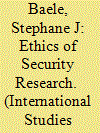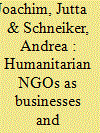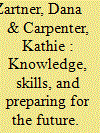|
|
|
Sort Order |
|
|
|
Items / Page
|
|
|
|
|
|
|
| Srl | Item |
| 1 |
ID:
159419


|
|
|
|
|
| Summary/Abstract |
Existing theories of the rentier state are essentially static, but rentier states are not monolithic and unchanging; most have economies built on the extraction of non-renewable resources, and at some point those resources will be exhausted. What happens then? In this paper, I argue that the case of Nauru may provide some guideposts. The existing concept of the rentier state is actually one component of a larger temporal typology. Rentier states can, and most will, eventually become post-rentier states. Post-rentier states have exhausted the resource wealth that formerly financed the state, and because of the perverse incentives of rentierism are ill equipped to function in the modern world economy. The paper concludes by outlining a dynamic theory of the rentier state.
|
|
|
|
|
|
|
|
|
|
|
|
|
|
|
|
| 2 |
ID:
159416


|
|
|
|
|
| Summary/Abstract |
Scholars in the field of peace and conflict studies have long worried that their discipline is divided – between studies of war and war making, and studies of peace and peacemaking. However, empirical research into the existence, extent, and nature of such a division is scarce. We remedy this by addressing two questions: 1) how is work in the field of peace and conflict studies distributed between its two nominal pillars: “peace” and (violent) “conflict”? and 2) to what extent is there communication and exchange between the two sets of studies? Making use of a unique combination of methods, we find that studies of violence hold a dominant position in the field, although there is also a sizable body of work that explores topics of peace, understood as conflict prevention and/or response. That said, we find limited evidence of intellectual exchange between studies of war/making and peace/making. We also find evidence of gendered, regional, and methodological divides. We argue that such schisms may be preventing scholars of peace and conflict from collectively realizing the founding ontological goal of their discipline, which was to understand the causes of war in order to contribute to an understanding of how conflict can be managed peacefully.
|
|
|
|
|
|
|
|
|
|
|
|
|
|
|
|
| 3 |
ID:
159415


|
|
|
|
|
| Summary/Abstract |
Offering a framework for ethical assessment, this article draws attention to the ethical issues accompanying empirical research on security. Speaking to the various subfields and schools of broadly conceived applied security studies, we classify the many ethical issues specific to empirical research on security, conflict, and political violence into researcher-related problems, subject-related problems, and result-related problems. We evaluate the importance and variations of these issues and highlight potential mitigation pathways. This effort brings together an existing but fragmented literature and builds upon the authors’ own experiences in several subfields and schools of “hands-on” research on security and political violence.
|
|
|
|
|
|
|
|
|
|
|
|
|
|
|
|
| 4 |
ID:
159418


|
|
|
|
|
| Summary/Abstract |
Humanitarian nonprofit nongovernmental organizations (NGOs) today exhibit signs of “marketization” and behave like firms, according to a frequently uttered claim in the scholarly literature. However, it is not precisely clear what marketization and behaving like a firm mean. Drawing on the literature concerning nonprofit organizations and public administration, we offer a more sophisticated and multifaceted understanding of a consequential development for NGOs. Rather than merely equating “firm-like” with the adoption of corporate practices, we conceive of it as a mind-set. We suggest that “firm-like” involves not only marketization, but also corporatization and organizational rationalization. Based on a content analysis of the websites of a heterogeneous sample of nine humanitarian NGOs, we illustrate the potential of this conceptualization to shed light on a discourse among these organizations that appears to be self-referential and self-aggrandizing with respect to their capacities.
|
|
|
|
|
|
|
|
|
|
|
|
|
|
|
|
| 5 |
ID:
159417


|
|
|
|
|
| Summary/Abstract |
Higher education is at a point of transition. Colleges and universities are considering new ways to attract students through innovative programs that stay true to their educational mission and also prepare students for the current job market. Employers consistently talk about the skills they need in graduates they hire, including critical thinking, strong writing, adaptability, and cultural competency. International studies as a major is perfectly poised to provide students with both the academic grounding they need to better understand the world around them and the skills necessary to make them desirable to employers. Communicating the skills and content that coursework in the major offers, however, is often not a straightforward process. Students have both skills and content knowledge, but two key issues need to be addressed: (1) how can faculty better communicate to students the skills and knowledge we want them to gain from our classes, and (2) how do we enable students to understand and articulate these skills to future employers? This article addresses these questions by examining the contributions of international studies with regard to building skills in the classroom, enhancing cultural competency, promoting language training, developing networking capacity, and preparing students for life after college.
|
|
|
|
|
|
|
|
|
|
|
|
|
|
|
|
|
|
|
|
|